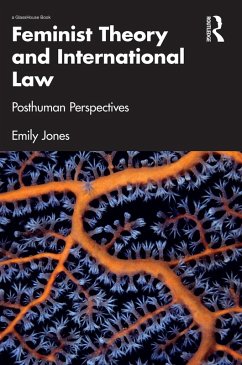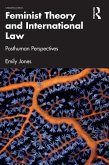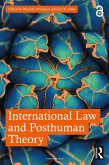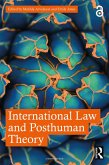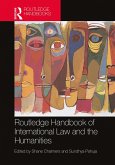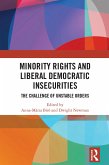Dieser Download kann aus rechtlichen Gründen nur mit Rechnungsadresse in A, B, BG, CY, CZ, D, DK, EW, E, FIN, F, GR, HR, H, IRL, I, LT, L, LR, M, NL, PL, P, R, S, SLO, SK ausgeliefert werden.
Hinweis: Dieser Artikel kann nur an eine deutsche Lieferadresse ausgeliefert werden.
Pragmatic, but theoretically savvy, Jones combines critique with creativity by proposing alternative sources that many help overcome legal liberalism. Posthuman Feminism, Queering the Nonhuman, Indigenous Epistemologies, New Materialism, and the Rights of Nature movement are just some of the toolkits this remarkable book provides as a way forward.
Emily Jones holds legal discourse accountable but also confirms its ability to change and construct more inclusive, sustainable and just worlds. A major work that will leave a mark." Rosi Braidotti, Distinguished Professor Emerita, Utrecht University, the Netherlands.
"Anchoring us in new possibilities, this impressive work explains what posthuman feminist perspectives offer to the urgent task of superseding international law's deadly imperial anthropocentrism by fostering legal systems capable of sustaining life in all its forms. Drawing on a staggering array of interdisciplinary critical scholarship, Jones illustrates some of the paradigm shifts that are necessary if we, and the planet, are to survive (let alone flourish) in these posthuman times. To illustrate, she engages adeptly with current debates in two areas of international law - the regulation of lethal military technologies and international environmental law. Along the way Jones remains cognisant of the many tensions that can compromise or co-opt feminist efforts to change international law's neoliberal humanist orientation from within, readily acknowledging that posthuman feminist change is also necessary outside the law and may even require a turning away from law." Dianne Otto, Melbourne Law School, Australia.
"In this meticulously researched and beautifully written book, Emily Jones draws on posthuman feminism to both highlight and question international law's constitutive boundaries: human/nature, human/technology and, perhaps above all, the boundaries imposed upon feminist legal theory in the field. By applying a radically egalitarian feminist framework to the laws of war and international environmental law, Jones reveals that some of the most urgent problems of our times, war, climate change and anti-feminist backlash, are much more interconnected than we might have thought." Ntina Tzouvala, Associate Professor, ANU College of Law, Australian National University.
"Feminist Theory and International Law: Posthuman Perspectives makes a unique contribution to the field of international law at the same time as it unravels this legal area for scholars in both posthumanist and other critical schools of thought." Jannice Käll, Lund University, Sweden.

